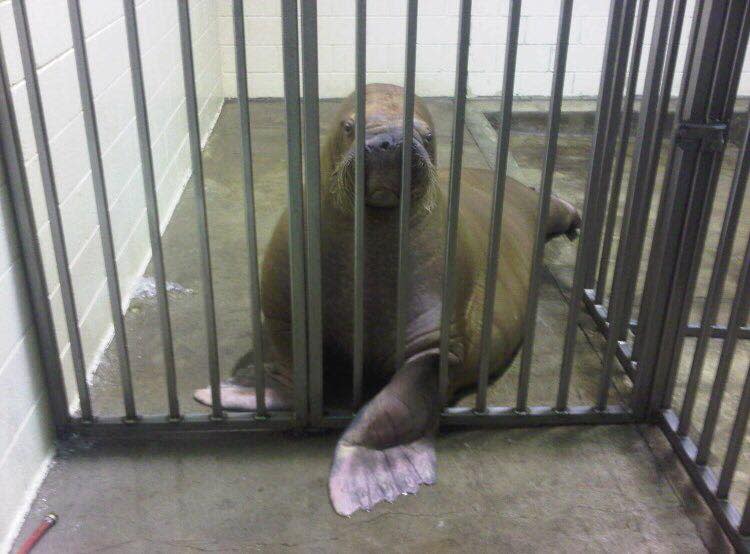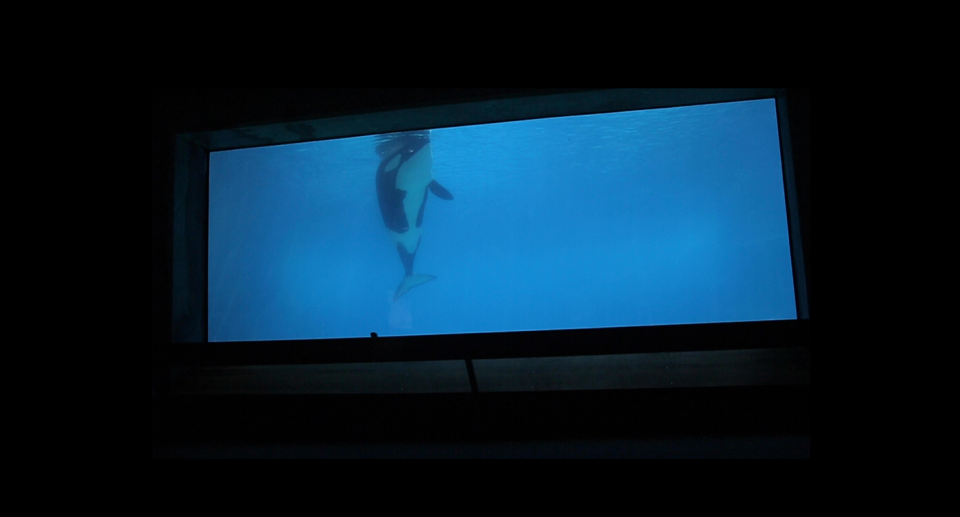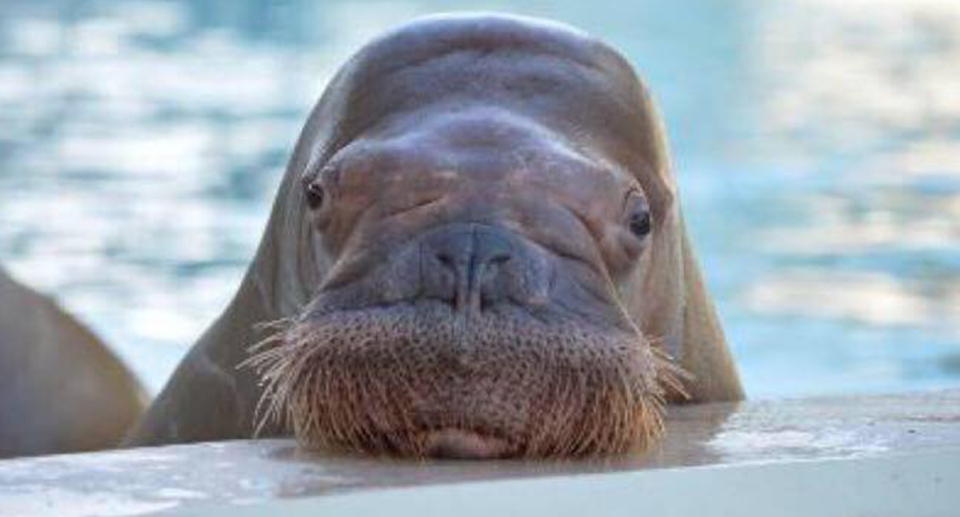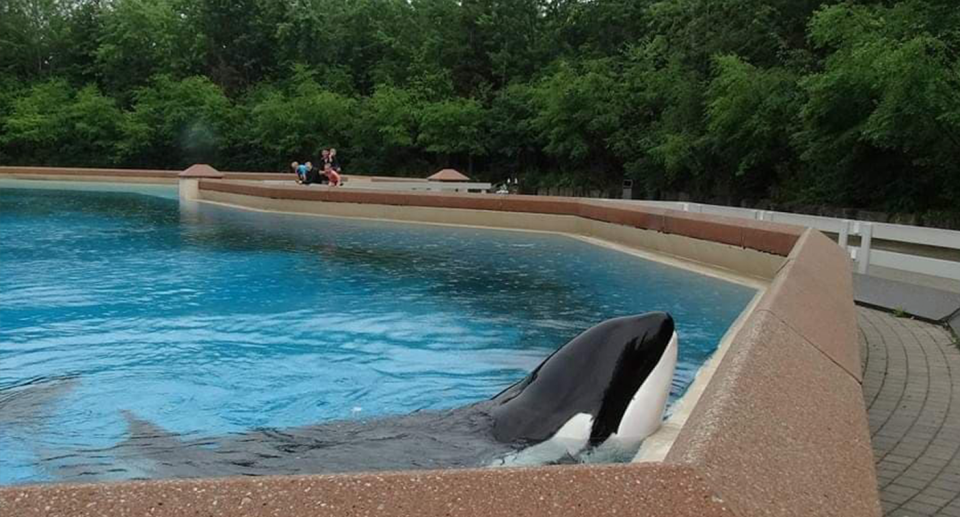'Beyond deplorable': Lonely animals around the world spend lives alone in 'concrete boxes'
From shopping malls to aquariums, around the world highly social animals are kept in isolation for the entertainment of people.
One such animal is a killer whale at MarineLand, Canada.
Forty-three-year-old Kiska repeats her route around the only home she’s known since being captured from the wild on October 1, 1979.
Activists who monitor the female suggest the once highly vocal animal seldom speaks now.
Among the 60 orcas kept in captivity at aquariums, two others - Lolita and Kshamenk live isolated from members of their own species, however they have the company of other marine mammals.
Dr Ingrid Visser, who has visited every captive orca on public display, singles out Kiska as being particularly “traumatised”.
“The situation for Kiska is beyond deplorable: she is kept in solitary confinement, in a tiny barren tank system,” she told Yahoo News Australia.


“It is important for people to know that this type of social isolation documented in animals, to be as painful as some physical injuries.
“When you consider that since 2008, in Switzerland, it has been illegal to keep even goldfish in solitary confinement, it is high time that the rest of the world recognised the suffering that this facility is forcing on Kiska.”
‘Never see the sun’: Polar bear caged in China
Dr Visser travels the world, researching and providing expert testimony about the plight of thousands of animals in captivity, but some individuals are hard to forget.
While the world may have forgotten about the plight of a polar bear named Pizza who was kept in a Chinese shopping mall, Dr Visser has continued to document his situation.
“It is distressing to see this polar bear, who the public cared so much about and was moved from deplorable conditions in a shopping mall in China, now in abysmally sub-standard conditions in an aquarium in Shanghai,” she said.
“If the public knew that he was just moved from a tiny indoor enclosure to a small indoor enclosure, they, like Pizza would not be satisfied.
“I have watched Pizza at the Haichang Ocean Park and it was tragic to see him pacing backwards and forwards; he is an animal that, in the wild, would travel thousands of kilometres in just a few weeks, yet is now trapped in a concrete box and will never see the sun or feel the wind blow through is fur again.”
‘It’s just insane’: Walrus isolated from own kind
Another animal held at MarineLand, Canada, continues to garner much attention in the media is a walrus named Smooshi.


Her then trainer Phil Demers appeared on Jimmy Kimmel Live in 2007 to tell the “heartwarming story” of Smooshi believing him to be her mother after she imprinted on him as a baby.
Five years later, Mr Demers quit the facility citing unhealthy conditions at the park, and the other walruses have all since died.
Mr Demers has been banned from reentering MarineLand for speaking out and is now facing a lawsuit from the park, but he promises to continue to publicly advocate for Smooshi.
“All I want is what’s in her best interest, it’s all I have wanted from day one,” Mr Demers told Yahoo News Australia.
“She lost four of her tank mates in the last two years.
“It’s just insane that they won’t move her to address her wellbeing.”


‘Get her to perform’: Activist’s unconventional request
The solution for animals kept in captivity is seldom simple, and while Demers wants Smooshi to be relocated from MarineLand, most activists want to see Kiska stay there - at least in the near future.
Ontario Captive Animal Watch president Carly Ferguson worked with the Canadian government to establish the S203 laws which prevent any new dolphins, belugas or orcas being brought into the country and bans captive breeding.
This resulted in an unintended consequence.
Kiska is effectively stranded in isolation by the laws.
Yet Ms Ferguson doesn’t want to see her moved to another aquarium.
She is concerned that Kiska, if dropped at another park, would be attacked by other killer whales who can become highly aggressive when in they are in captivity.
“To pick her up after being at MarineLand after 40 years - I don’t know whether or not she’d even survive a trip to China,” she said.
“If she was plonked into another tank with orcas they’d probably beat up on her, I just can’t imagine.”


Instead she has found herself advocating for something she would normally be strongly opposed to - teaching her tricks.
“You see a lot of activists say stop performing, stop performing, but I’m over here saying, no, get this whale to do something.
“Get her to perform - give her brain something to do.”
Dr Visser doesn’t think there is a simple solution to Kiska’s situation, but there is one that she favours above all others.
“The best solution is to move her into seaside sanctuary so that she has natural stimulations and a large area to live in and at that point a compatible ex-captive companion might be successfully integrated at the pace that works for both of them,” she said.
“In the meantime, at the very least, Kiska should be given appropriate enrichment and better 24/7 care until she can go into a sanctuary.”
MarineLand Canada has been contacted by Yahoo News Australia, but has yet to provide comment.
Do you have a story tip? Email: newsroomau@yahoonews.com.
You can also follow us on Facebook and Twitter, download the Yahoo News app from the App Store or Google Play and stay up to date with the latest news with Yahoo’s daily newsletter. Sign up here.



